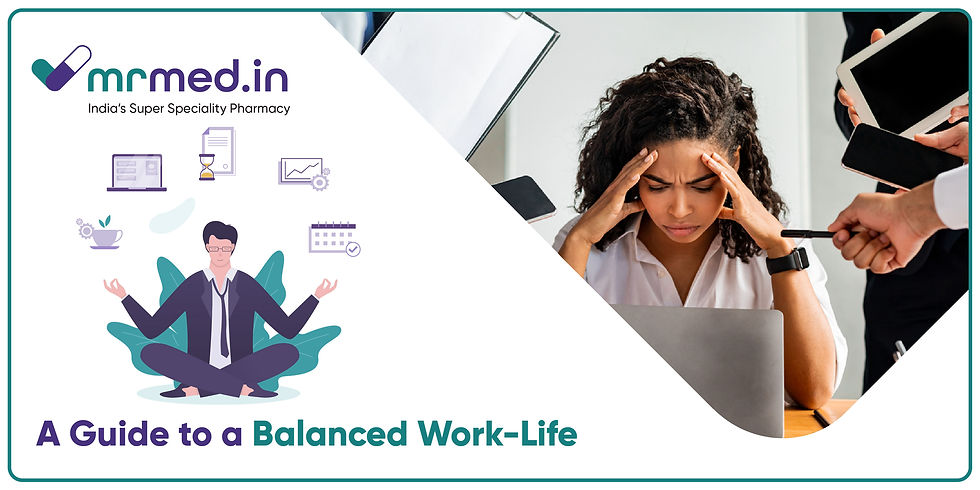Corporate Life and Mental Wellness: A Guide to Stress Relief and Resilience
- Healthcare Tips

- Dec 16, 2024
- 4 min read

Corporate life often comes with long hours, tight deadlines, and high expectations, making stress almost inevitable. The ten major causes of mental stress in the workplace include:
Heavy workloads: Balancing multiple projects with strict deadlines.
Lack of control: Minimal say in decisions affecting your role.
Unclear expectations: Vague job descriptions and goals.
Workplace conflicts: Difficult colleagues or uncooperative teams.
Job insecurity: Concerns over layoffs or downsizing.
Technology overload: Being perpetually connected through emails and messages.
Poor work-life balance: Struggling to separate professional and personal lives.
Monotonous tasks: Lack of variety or creative challenges in daily work.
Micromanagement: Leaders who don’t allow autonomy.
Inadequate support: Lack of acknowledgement or feedback from management.
How Does Stress Affect Mental Wellness?
Chronic stress significantly impacts mental and physical health. Prolonged exposure to stressful environments can lead to issues such as:
Anxiety and depression: Persistent worry and feelings of inadequacy.
Burnout: A state of emotional, physical, and mental exhaustion.
Poor cognitive function: Difficulty concentrating or making decisions.
Physical symptoms: Headaches, digestive problems, and weakened immunity.
For example, many professionals report experiencing sleepless nights before major presentations, highlighting the deep connection between stress and mental health.
What Are Effective Ways to Relieve Mental Stress?
Building resilience and practising stress-relief techniques can improve mental wellness. Here are some ways to relieve mental stress:
Mindfulness practices: Meditation, yoga, or simply focusing on the present moment can calm your mind.
Physical activity: Regular exercise releases endorphins, which are natural stress-busters.
Time management: Prioritizing tasks and delegating responsibilities reduces overwhelm.
Breaks: Step away from work periodically to recharge.
Nutritional support: Supplements like Fuel ONE Capsule or adaptogenic herbs such as ashwagandha, brahmi, and tulsi can help your body better manage stress.
Breathing exercises: Techniques like box breathing or 4-7-8 breathing help alleviate acute stress.
Hobbies: Engaging in activities outside of work provides a mental escape.
Social support: Talking to friends, family, or a therapist can offer perspective and relief.
How Can Corporate Employees Cultivate Resilience?
Resilience is the ability to adapt and thrive despite challenges. Employees can build resilience by adopting certain habits:
Positive mindset: Practice gratitude and focus on accomplishments rather than setbacks.
Healthy routines: Maintain consistent sleep, nutrition, and exercise habits.
Boundaries: Set clear limits for work hours to prevent burnout.
Continuous learning: Developing new skills fosters confidence and adaptability.
Supportive communities: Join professional networks or wellness groups.
Are There Natural Solutions for Stress Relief?
Nature offers several remedies to soothe anxiety and stress. Herbal supplements and extracts have been traditionally used in Ayurveda to restore balance:
Cannabis leaf extract: Known for its calming properties.
Ashwagandha: Reduces cortisol levels, helping to manage stress.
Tulsi (holy basil): Supports adrenal health and boosts immunity.
Brahmi: Enhances memory and reduces anxiety.
Products like Soothes Anxiety & Stress Mint combine these natural ingredients to provide easy, effective relief. Integrating such solutions into your routine can complement other wellness practices.
What Are Some Mental Health Tips for Women in Corporate Life?
Women often face unique challenges in the workplace, from balancing multiple roles to breaking through glass ceilings. Here are mental health tips for women:
Prioritise self-care: Set aside time for activities that rejuvenate you.
Ask for help: Seek support from colleagues, family, or friends when needed.
Address workplace biases: Advocate for fairness and inclusivity.
Build a network: Connect with other professional women for mentorship and support.
Practice assertiveness: Communicate boundaries and advocate for your needs.
For example, organisations offering flexible work arrangements empower women to balance professional and personal responsibilities better.
What Are the Best Mental Health Tips for Working Professionals?
Here are mental health tips for working professionals to maintain balance and well-being:
Start your day right: Incorporate a morning routine with meditation or exercise.
Set achievable goals: Focus on small, manageable tasks to maintain motivation.
Take regular breaks: Follow the Pomodoro technique to boost productivity.
Stay hydrated and nourished: A healthy diet supports cognitive and emotional health.
Limit screen time: Reduce exposure to devices after work hours.
Declutter your workspace: A clean, organised environment enhances focus.
Practice gratitude: Reflect on positive aspects of your day.
Invest in hobbies: Pursue interests outside of work for mental rejuvenation.
Seek professional help: Don’t hesitate to consult a therapist for persistent issues.
Celebrate achievements: Recognize and reward your milestones, no matter how small.
How Can Companies Support Mental Wellness?
Employers play a crucial role in promoting mental wellness. Companies can adopt these measures to create healthier work environments:
Employee assistance programs (EAPs): Offer confidential counselling and support services.
Wellness initiatives: Provide gym memberships, mindfulness sessions, or wellness apps.
Flexible policies: Allow remote work or flexible hours to accommodate diverse needs.
Open communication: Foster a culture where employees feel comfortable discussing mental health.
Training managers: Educate leaders to identify signs of stress and provide support.
Corporate life doesn’t have to come at the cost of mental wellness. Companies must also prioritise creating supportive environments that enable employees to thrive. Ultimately, mental wellness is a shared responsibility—one that benefits individuals, teams, and organisations alike.
Comments